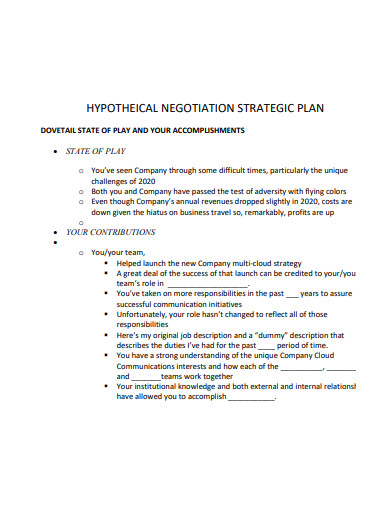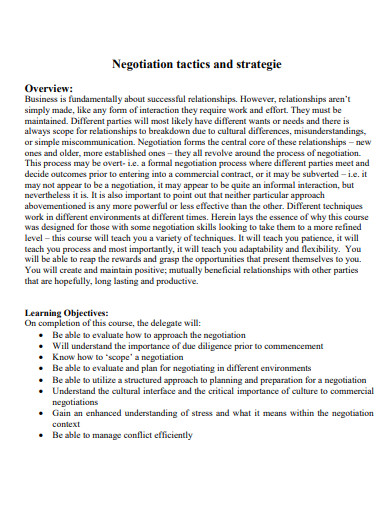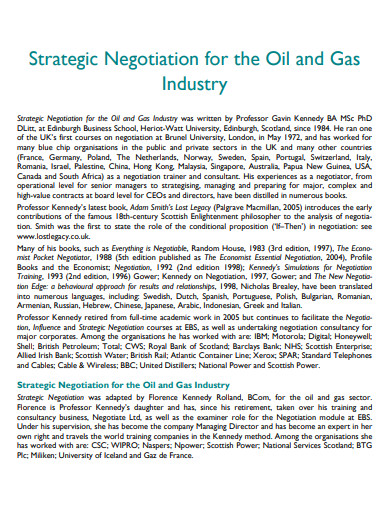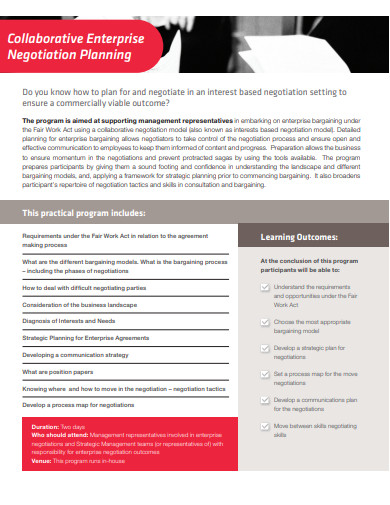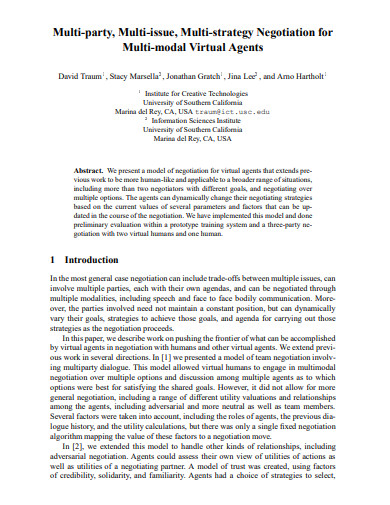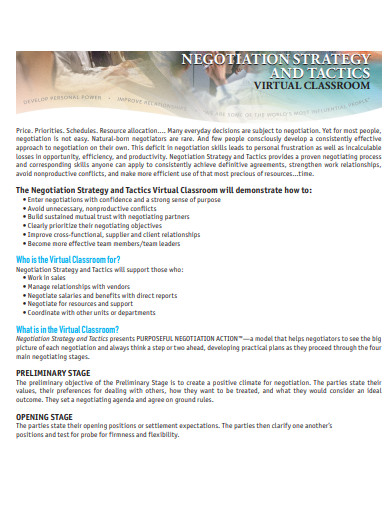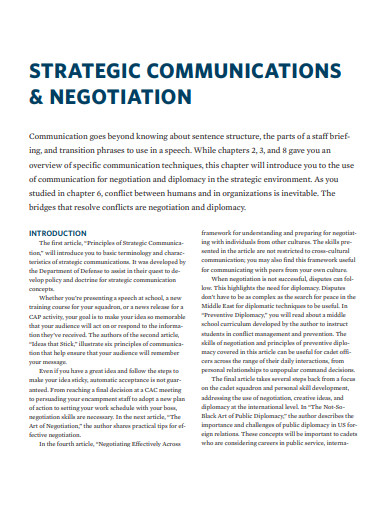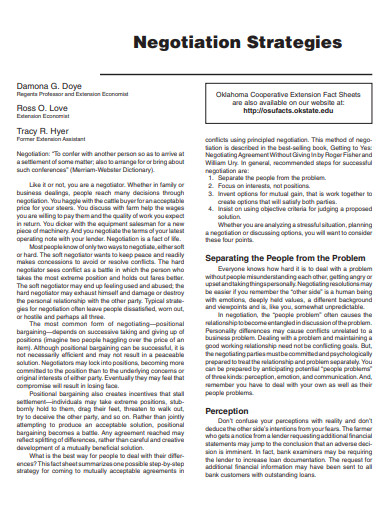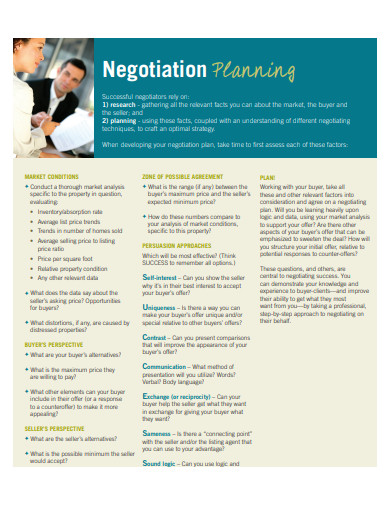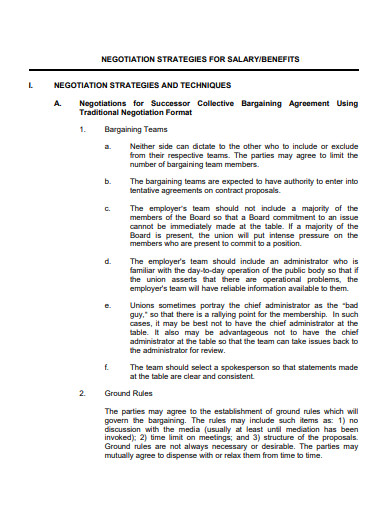A reactive strategy is sufficient for most ordinary conversations. When the risks are minimal, good negotiators may shift from one approach to the next with relative ease when the other side makes advances, and this is typically enough to ensure that the final bargain properly represents their worth. Dealmakers, on the other hand, occasionally find themselves in more complicated talks with bigger risks. In those cases, a far more robust technique is required. Negotiators, like corporate, political, and military leaders, require a strategic framework that outlines the important decisions they must make in order to attain their ultimate goals.
10+ Negotiation Strategy Plan Samples
We must first learn to prepare in order to perform successfully and consistently. Ask any athlete or lawyer ready to enter a courtroom who has spent many hours training for a competition. We advise our soon-to-be graduates to schedule time in their busy calendars to prepare for their negotiations at the conclusion of our negotiation training classes. While your time will be demanded by many coworkers, clients, and suppliers on a regular basis, they will rarely urge you to spend extra time preparing for your discussions with them. However, this is exactly what we require in order to develop an effective negotiation strategy.
1. Negotiation Strategy Plan
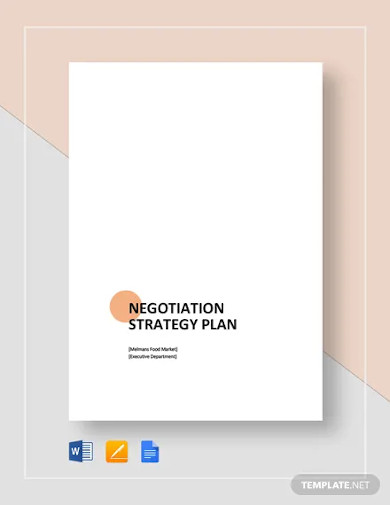
2. Hypothetical Negotiation Strategy Plan
3. Sample Negotiation Strategy Plan
4. Strategic Negotiation Plan for the Oil and Gas Industry
5. Collaborative Enterprise Negotiation Strategy Plan
6. Multi Strategy Negotiation Plan
7. Negotiation Strategy and Tactics Plan
8. Strategic Communication and Negotiation Plan
9. Formal Negotiation Strategy Plan
10. Professional Negotiation Strategy Plan
11. Printable Negotiation Strategy Plan
Developing a Negotiation Strategy Plan
People in business are known to be affected by stress and pressure in powerful and long-lasting ways. These tensions can drive hard work from union employees to corporate leaders, but they can also cause internal conflicts within the same firm. Being able to use effective stress management tactics in the face of adversity can lead to improved performance and, eventually, increased chances of success.
- Define your role and your goal – In order to design an effective negotiation strategy, you must first clearly comprehend your goal. Is there something at work that’s keeping you from reaching your full potential? Are you attempting to gain a promotion? What are your top priorities, and how willing are you to make concessions?
- Try to understand your value – What skills do you bring to the team that no one else has? In your absence, how would the company function? And how much would replacing you cost the organization in terms of time, money, and effort? Avoid imagining these things in a negative perspective as a threat to the company’s survival. Instead, think about your efforts in a positive light: if you’re already achieving a lot, imagine how much more you could accomplish with more resources or fewer failures.
- Understand the vantage point of your counterpart – Who are you dealing with, and what is their background? It’s critical to acknowledge and respect their viewpoint. Is your counterpart fully aware of the significance of the work you do? What can you do to help them see the full worth of your contributions? You should also keep track of any other unstated circumstances that could influence the negotiation’s dynamics.
- Check yourself – Stress and anxiety, like any other emotion, can impair your capacity to advocate for your cause calmly and sensibly. Before beginning any negotiation, attempt to relax and convert your stress into energy to fuel your desire to succeed. Negotiation success is dependent on a variety of things, but with appropriate preparation and an emphasis on gaining your counterpart’s trust, you may start creating value before the negotiation even begins.
FAQs
Why do you have to assess the situation?
Regardless of how many times we’ve dealt with comparable scenarios, each negotiation will be unique. Naturally, we will be negotiating with people who have diverse negotiation styles, ambitions, and objectives. These people will come from various backgrounds and have varying standards. As a result, constantly take stock and assess which negotiation abilities you and your team will need for each discussion.
What are types of conflict in a negotiation?
In a negotiation, there are two types of conflict scenarios that we may encounter. Conflicts might present themselves in one of two ways: individually or in a combination of the two. To fully comprehend the particular challenges of each, the negotiator must carefully evaluate the conflict concerns, both individually and collectively. The first type of conflict is referred to as agreement conflict. The allocation of resources, such as money, quantity, production, or simply “things,” is the second type of conflict.
You can employ a variety of negotiation methods and techniques, but it’s crucial to pick ones that feel good and ethical to you. Trying to adopt a strong style when it’s not in your nature may result in a passable outcome, but it won’t feel nice, and you could probably have reached the same goal using techniques that were more natural and true to yourself.
Related Posts
FREE 7+ Fashion Business Plan Samples in PDF
FREE 10+ Sprint Planning Samples In MS Word | Google Docs | PDF
FREE 10+ Wedding Planning Samples in MS Word | Apple Pages | Powerpoint | PDF
FREE 9+ Monthly Study Planner Samples in PSD | Illustrator | InDesign | PDF
FREE 9+ Sample Curriculum Planning Templates in PDF | MS Word
FREE 10+ Teacher Development Plan Samples in MS Word | Google Docs | Apple Pages | PDF
FREE 10+ Basketball Practice Plan Samples in PDF
FREE 12+ School Business Plan Samples in PDF | MS Word | Apple Pages | Google Docs
FREE 7+ Client Strategic Plan Samples in PDF | MS Word
FREE 11+ Trucking Business Plan Templates in PDF | MS Word | Google Docs | Pages
FREE 7+ Small Hotel Business Plan Samples PDF | MS Word | Apple Pages | Google Docs
FREE 14+ Bakery Business Plans in MS Word | PDF | Google Docs | Pages
FREE 4+ Yearly Lesson Plan Samples in PDF
FREE 50+ Strategic Planning Samples in Google Docs | Pages | PDF | MS Word
FREE 10+ Construction Project Plan Samples in MS Word | Google Docs | Apple Pages | PDF

